HC2121 Business Ethics Analysis: Woolworths' Ethical and CSR Issues
VerifiedAdded on 2022/10/19
|8
|2266
|16
Essay
AI Summary
This essay provides a comprehensive analysis of the ethical issues surrounding Woolworths, an Australian company, focusing on its involvement in gambling operations through its ALH Group and its data collection practices. The essay delves into key ethical concerns, including the potential for gambling addiction and the exploitation of customer data for profit. It explores relevant moral philosophies such as stakeholder theory, corporate social responsibility (CSR), and deontological ethics to evaluate Woolworths' actions. The analysis highlights the importance of considering stakeholders' interests, including customers, employees, and the community, and suggests that Woolworths should adopt CSR principles to mitigate ethical risks. The essay concludes by recommending that Woolworths prioritize stakeholder theory to regain public trust and ensure ethical decision-making in future business endeavors. The essay also discusses the Commonwealth Gambling Measures Act 2012 and the company's failure to adopt preventative measures, which highlights the unethical actions undertaken by the company. The essay uses a variety of sources to support its arguments, including academic journals, news articles, and government reports.
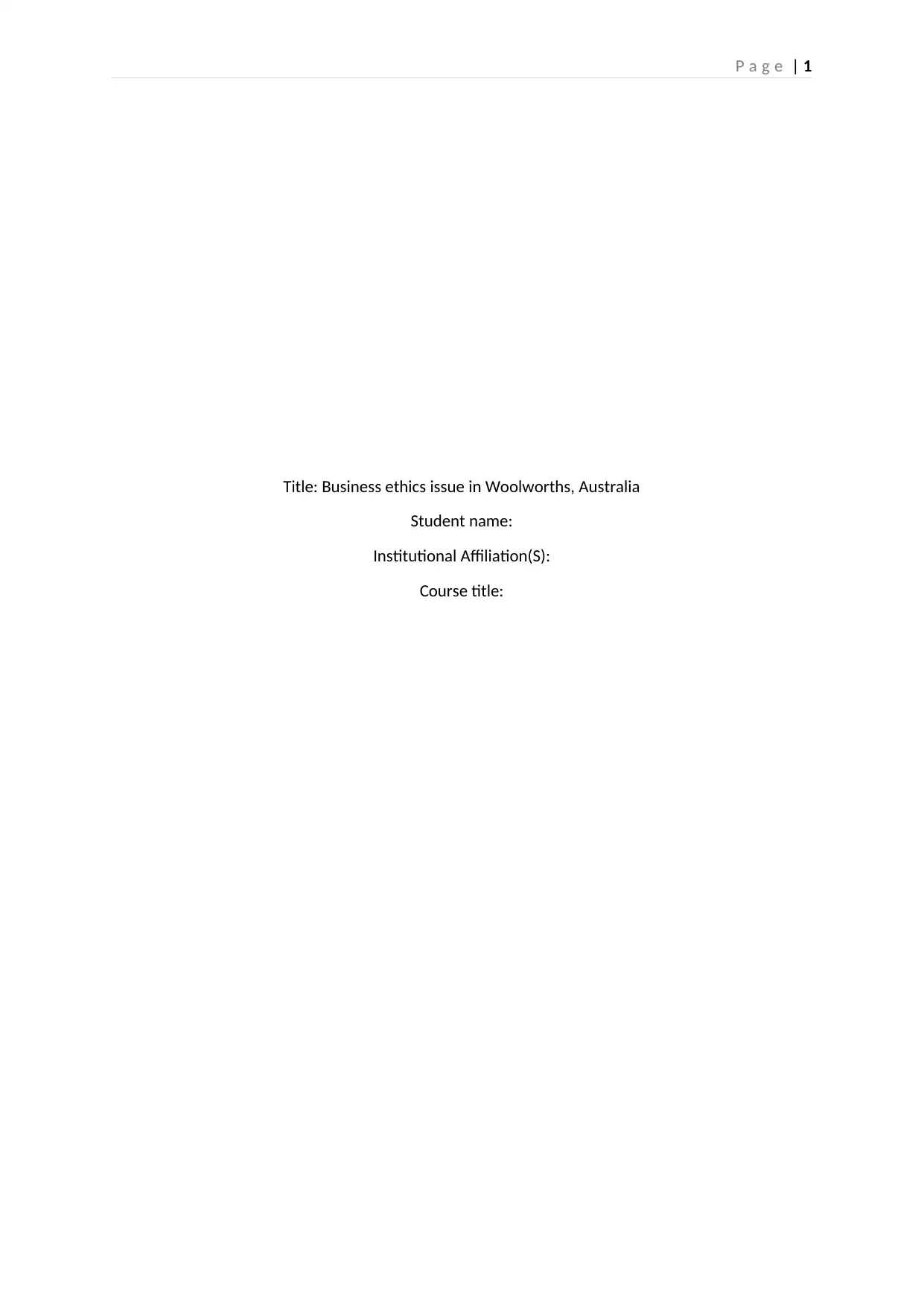
P a g e | 1
Title: Business ethics issue in Woolworths, Australia
Student name:
Institutional Affiliation(S):
Course title:
Title: Business ethics issue in Woolworths, Australia
Student name:
Institutional Affiliation(S):
Course title:
Paraphrase This Document
Need a fresh take? Get an instant paraphrase of this document with our AI Paraphraser
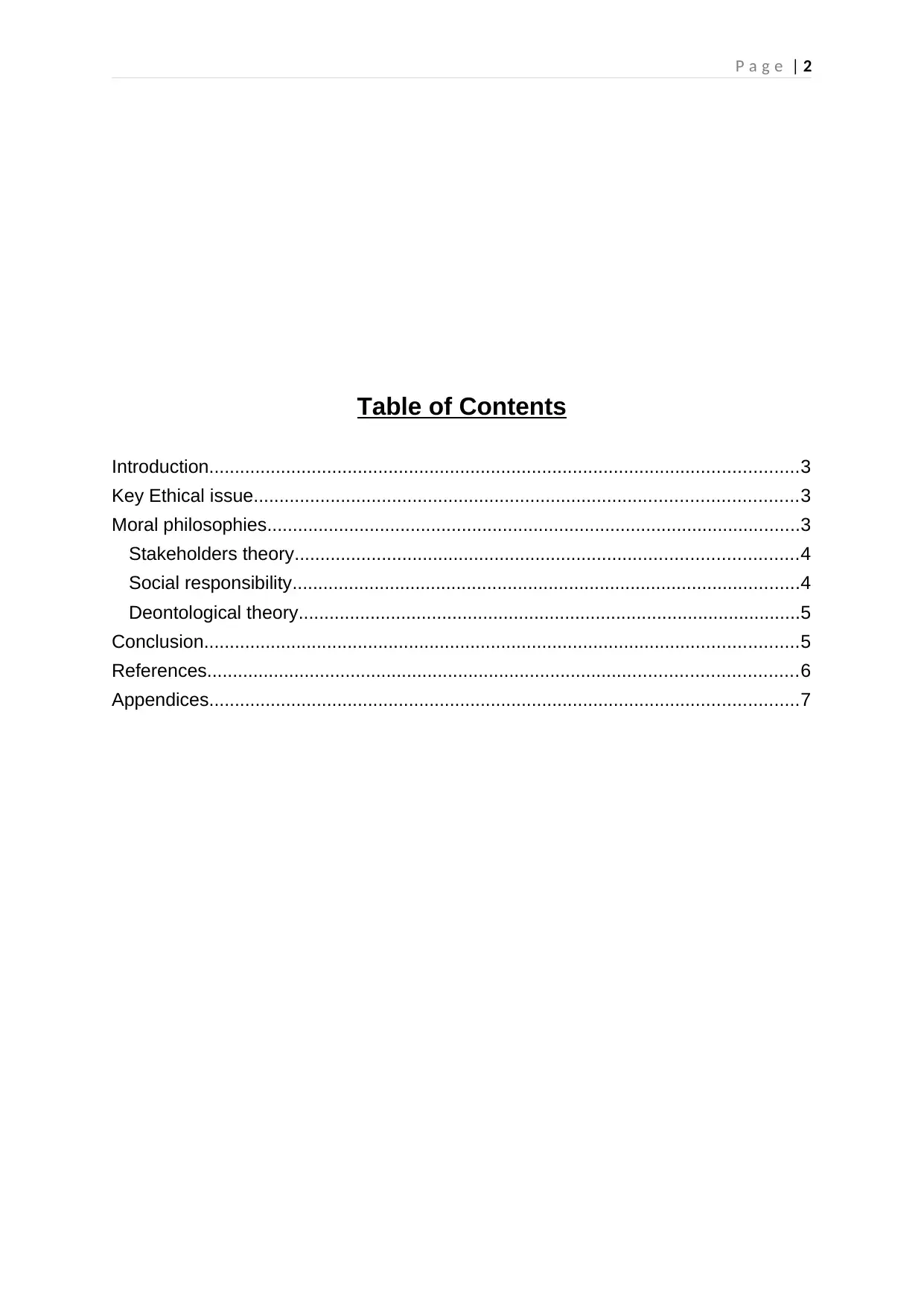
P a g e | 2
Table of Contents
Introduction...................................................................................................................3
Key Ethical issue..........................................................................................................3
Moral philosophies........................................................................................................3
Stakeholders theory..................................................................................................4
Social responsibility...................................................................................................4
Deontological theory..................................................................................................5
Conclusion....................................................................................................................5
References...................................................................................................................6
Appendices...................................................................................................................7
Table of Contents
Introduction...................................................................................................................3
Key Ethical issue..........................................................................................................3
Moral philosophies........................................................................................................3
Stakeholders theory..................................................................................................4
Social responsibility...................................................................................................4
Deontological theory..................................................................................................5
Conclusion....................................................................................................................5
References...................................................................................................................6
Appendices...................................................................................................................7
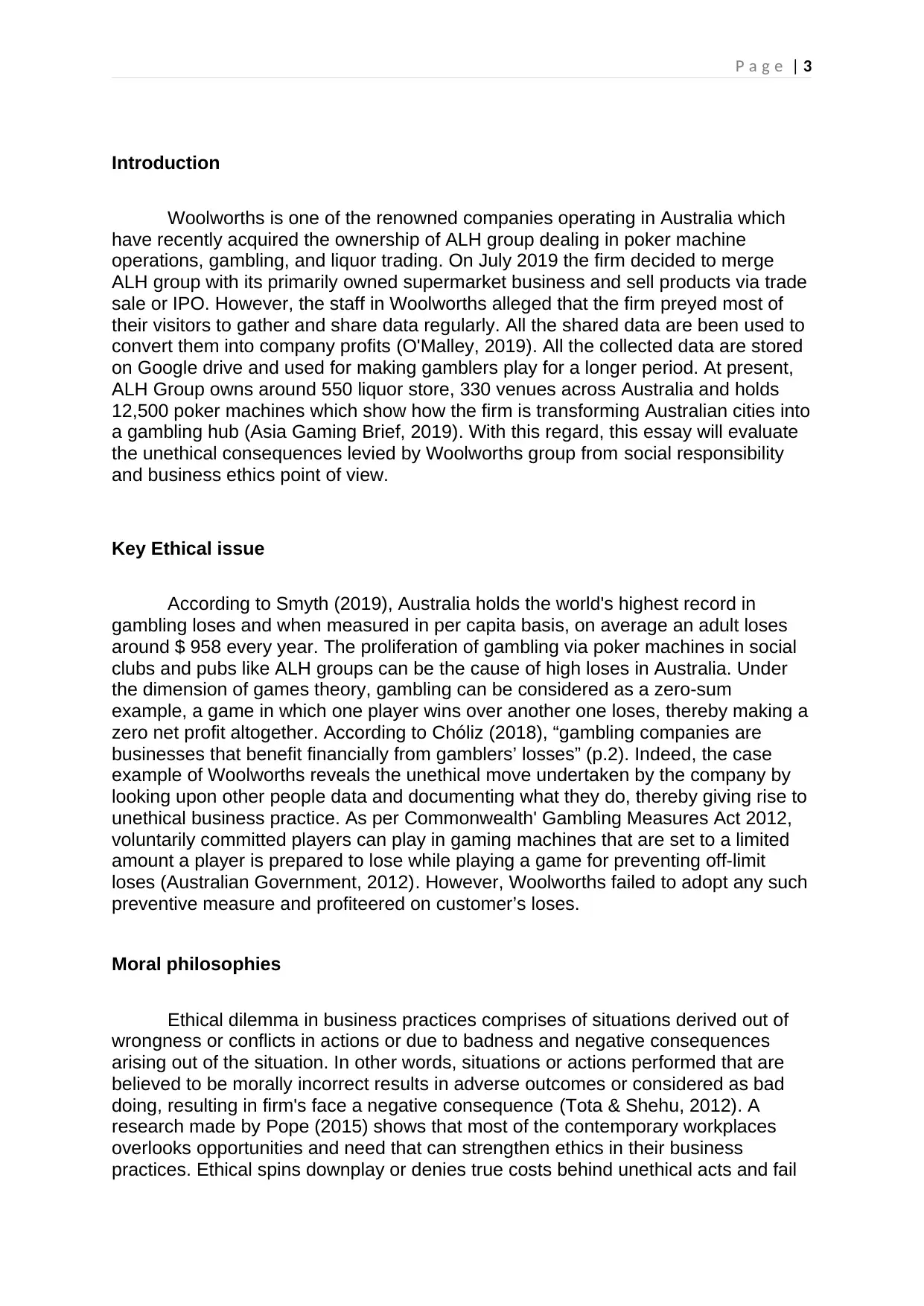
P a g e | 3
Introduction
Woolworths is one of the renowned companies operating in Australia which
have recently acquired the ownership of ALH group dealing in poker machine
operations, gambling, and liquor trading. On July 2019 the firm decided to merge
ALH group with its primarily owned supermarket business and sell products via trade
sale or IPO. However, the staff in Woolworths alleged that the firm preyed most of
their visitors to gather and share data regularly. All the shared data are been used to
convert them into company profits (O'Malley, 2019). All the collected data are stored
on Google drive and used for making gamblers play for a longer period. At present,
ALH Group owns around 550 liquor store, 330 venues across Australia and holds
12,500 poker machines which show how the firm is transforming Australian cities into
a gambling hub (Asia Gaming Brief, 2019). With this regard, this essay will evaluate
the unethical consequences levied by Woolworths group from social responsibility
and business ethics point of view.
Key Ethical issue
According to Smyth (2019), Australia holds the world's highest record in
gambling loses and when measured in per capita basis, on average an adult loses
around $ 958 every year. The proliferation of gambling via poker machines in social
clubs and pubs like ALH groups can be the cause of high loses in Australia. Under
the dimension of games theory, gambling can be considered as a zero-sum
example, a game in which one player wins over another one loses, thereby making a
zero net profit altogether. According to Chóliz (2018), “gambling companies are
businesses that benefit financially from gamblers’ losses” (p.2). Indeed, the case
example of Woolworths reveals the unethical move undertaken by the company by
looking upon other people data and documenting what they do, thereby giving rise to
unethical business practice. As per Commonwealth' Gambling Measures Act 2012,
voluntarily committed players can play in gaming machines that are set to a limited
amount a player is prepared to lose while playing a game for preventing off-limit
loses (Australian Government, 2012). However, Woolworths failed to adopt any such
preventive measure and profiteered on customer’s loses.
Moral philosophies
Ethical dilemma in business practices comprises of situations derived out of
wrongness or conflicts in actions or due to badness and negative consequences
arising out of the situation. In other words, situations or actions performed that are
believed to be morally incorrect results in adverse outcomes or considered as bad
doing, resulting in firm's face a negative consequence (Tota & Shehu, 2012). A
research made by Pope (2015) shows that most of the contemporary workplaces
overlooks opportunities and need that can strengthen ethics in their business
practices. Ethical spins downplay or denies true costs behind unethical acts and fail
Introduction
Woolworths is one of the renowned companies operating in Australia which
have recently acquired the ownership of ALH group dealing in poker machine
operations, gambling, and liquor trading. On July 2019 the firm decided to merge
ALH group with its primarily owned supermarket business and sell products via trade
sale or IPO. However, the staff in Woolworths alleged that the firm preyed most of
their visitors to gather and share data regularly. All the shared data are been used to
convert them into company profits (O'Malley, 2019). All the collected data are stored
on Google drive and used for making gamblers play for a longer period. At present,
ALH Group owns around 550 liquor store, 330 venues across Australia and holds
12,500 poker machines which show how the firm is transforming Australian cities into
a gambling hub (Asia Gaming Brief, 2019). With this regard, this essay will evaluate
the unethical consequences levied by Woolworths group from social responsibility
and business ethics point of view.
Key Ethical issue
According to Smyth (2019), Australia holds the world's highest record in
gambling loses and when measured in per capita basis, on average an adult loses
around $ 958 every year. The proliferation of gambling via poker machines in social
clubs and pubs like ALH groups can be the cause of high loses in Australia. Under
the dimension of games theory, gambling can be considered as a zero-sum
example, a game in which one player wins over another one loses, thereby making a
zero net profit altogether. According to Chóliz (2018), “gambling companies are
businesses that benefit financially from gamblers’ losses” (p.2). Indeed, the case
example of Woolworths reveals the unethical move undertaken by the company by
looking upon other people data and documenting what they do, thereby giving rise to
unethical business practice. As per Commonwealth' Gambling Measures Act 2012,
voluntarily committed players can play in gaming machines that are set to a limited
amount a player is prepared to lose while playing a game for preventing off-limit
loses (Australian Government, 2012). However, Woolworths failed to adopt any such
preventive measure and profiteered on customer’s loses.
Moral philosophies
Ethical dilemma in business practices comprises of situations derived out of
wrongness or conflicts in actions or due to badness and negative consequences
arising out of the situation. In other words, situations or actions performed that are
believed to be morally incorrect results in adverse outcomes or considered as bad
doing, resulting in firm's face a negative consequence (Tota & Shehu, 2012). A
research made by Pope (2015) shows that most of the contemporary workplaces
overlooks opportunities and need that can strengthen ethics in their business
practices. Ethical spins downplay or denies true costs behind unethical acts and fail
⊘ This is a preview!⊘
Do you want full access?
Subscribe today to unlock all pages.

Trusted by 1+ million students worldwide
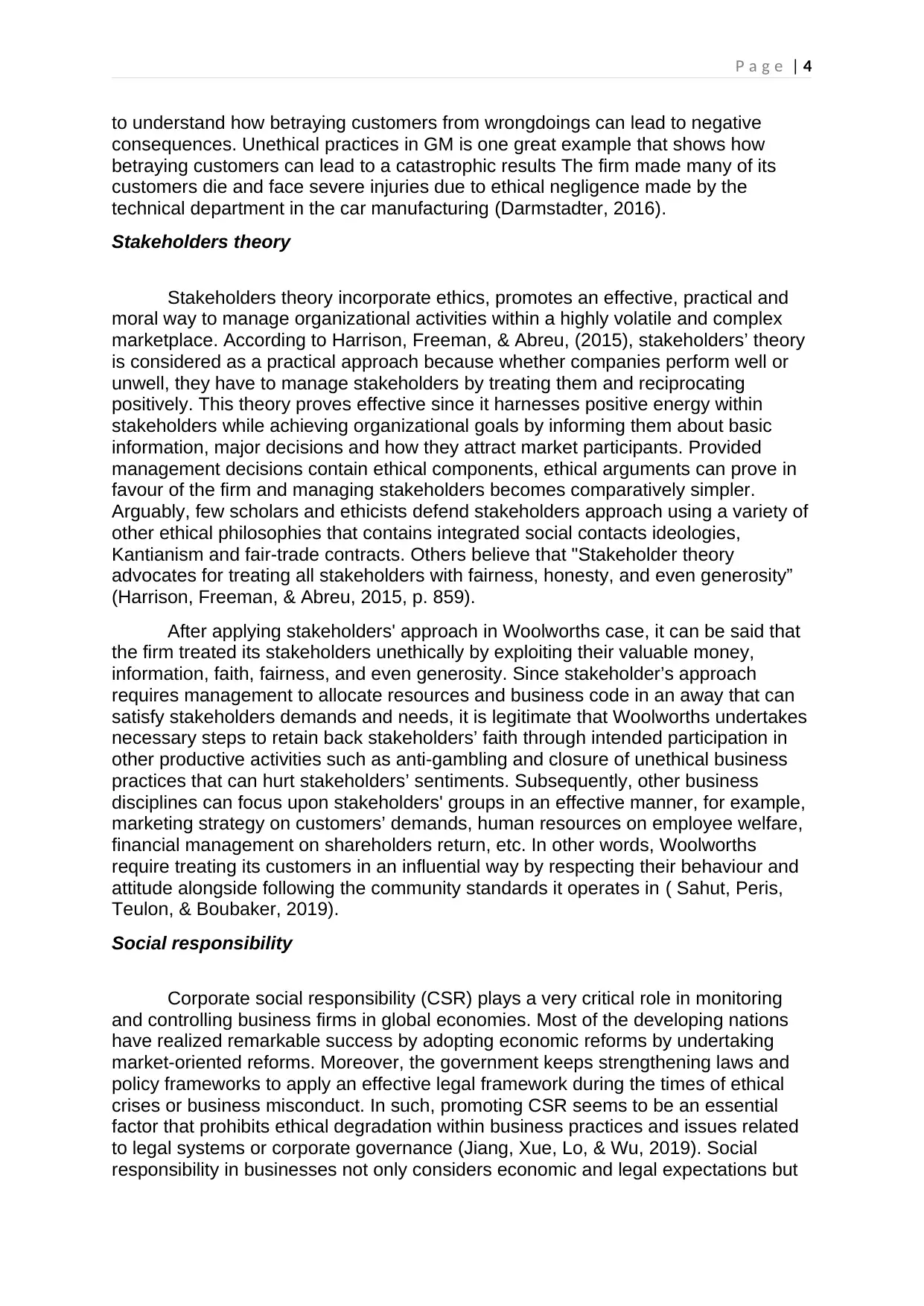
P a g e | 4
to understand how betraying customers from wrongdoings can lead to negative
consequences. Unethical practices in GM is one great example that shows how
betraying customers can lead to a catastrophic results The firm made many of its
customers die and face severe injuries due to ethical negligence made by the
technical department in the car manufacturing (Darmstadter, 2016).
Stakeholders theory
Stakeholders theory incorporate ethics, promotes an effective, practical and
moral way to manage organizational activities within a highly volatile and complex
marketplace. According to Harrison, Freeman, & Abreu, (2015), stakeholders’ theory
is considered as a practical approach because whether companies perform well or
unwell, they have to manage stakeholders by treating them and reciprocating
positively. This theory proves effective since it harnesses positive energy within
stakeholders while achieving organizational goals by informing them about basic
information, major decisions and how they attract market participants. Provided
management decisions contain ethical components, ethical arguments can prove in
favour of the firm and managing stakeholders becomes comparatively simpler.
Arguably, few scholars and ethicists defend stakeholders approach using a variety of
other ethical philosophies that contains integrated social contacts ideologies,
Kantianism and fair-trade contracts. Others believe that "Stakeholder theory
advocates for treating all stakeholders with fairness, honesty, and even generosity”
(Harrison, Freeman, & Abreu, 2015, p. 859).
After applying stakeholders' approach in Woolworths case, it can be said that
the firm treated its stakeholders unethically by exploiting their valuable money,
information, faith, fairness, and even generosity. Since stakeholder’s approach
requires management to allocate resources and business code in an away that can
satisfy stakeholders demands and needs, it is legitimate that Woolworths undertakes
necessary steps to retain back stakeholders’ faith through intended participation in
other productive activities such as anti-gambling and closure of unethical business
practices that can hurt stakeholders’ sentiments. Subsequently, other business
disciplines can focus upon stakeholders' groups in an effective manner, for example,
marketing strategy on customers’ demands, human resources on employee welfare,
financial management on shareholders return, etc. In other words, Woolworths
require treating its customers in an influential way by respecting their behaviour and
attitude alongside following the community standards it operates in ( Sahut, Peris,
Teulon, & Boubaker, 2019).
Social responsibility
Corporate social responsibility (CSR) plays a very critical role in monitoring
and controlling business firms in global economies. Most of the developing nations
have realized remarkable success by adopting economic reforms by undertaking
market-oriented reforms. Moreover, the government keeps strengthening laws and
policy frameworks to apply an effective legal framework during the times of ethical
crises or business misconduct. In such, promoting CSR seems to be an essential
factor that prohibits ethical degradation within business practices and issues related
to legal systems or corporate governance (Jiang, Xue, Lo, & Wu, 2019). Social
responsibility in businesses not only considers economic and legal expectations but
to understand how betraying customers from wrongdoings can lead to negative
consequences. Unethical practices in GM is one great example that shows how
betraying customers can lead to a catastrophic results The firm made many of its
customers die and face severe injuries due to ethical negligence made by the
technical department in the car manufacturing (Darmstadter, 2016).
Stakeholders theory
Stakeholders theory incorporate ethics, promotes an effective, practical and
moral way to manage organizational activities within a highly volatile and complex
marketplace. According to Harrison, Freeman, & Abreu, (2015), stakeholders’ theory
is considered as a practical approach because whether companies perform well or
unwell, they have to manage stakeholders by treating them and reciprocating
positively. This theory proves effective since it harnesses positive energy within
stakeholders while achieving organizational goals by informing them about basic
information, major decisions and how they attract market participants. Provided
management decisions contain ethical components, ethical arguments can prove in
favour of the firm and managing stakeholders becomes comparatively simpler.
Arguably, few scholars and ethicists defend stakeholders approach using a variety of
other ethical philosophies that contains integrated social contacts ideologies,
Kantianism and fair-trade contracts. Others believe that "Stakeholder theory
advocates for treating all stakeholders with fairness, honesty, and even generosity”
(Harrison, Freeman, & Abreu, 2015, p. 859).
After applying stakeholders' approach in Woolworths case, it can be said that
the firm treated its stakeholders unethically by exploiting their valuable money,
information, faith, fairness, and even generosity. Since stakeholder’s approach
requires management to allocate resources and business code in an away that can
satisfy stakeholders demands and needs, it is legitimate that Woolworths undertakes
necessary steps to retain back stakeholders’ faith through intended participation in
other productive activities such as anti-gambling and closure of unethical business
practices that can hurt stakeholders’ sentiments. Subsequently, other business
disciplines can focus upon stakeholders' groups in an effective manner, for example,
marketing strategy on customers’ demands, human resources on employee welfare,
financial management on shareholders return, etc. In other words, Woolworths
require treating its customers in an influential way by respecting their behaviour and
attitude alongside following the community standards it operates in ( Sahut, Peris,
Teulon, & Boubaker, 2019).
Social responsibility
Corporate social responsibility (CSR) plays a very critical role in monitoring
and controlling business firms in global economies. Most of the developing nations
have realized remarkable success by adopting economic reforms by undertaking
market-oriented reforms. Moreover, the government keeps strengthening laws and
policy frameworks to apply an effective legal framework during the times of ethical
crises or business misconduct. In such, promoting CSR seems to be an essential
factor that prohibits ethical degradation within business practices and issues related
to legal systems or corporate governance (Jiang, Xue, Lo, & Wu, 2019). Social
responsibility in businesses not only considers economic and legal expectations but
Paraphrase This Document
Need a fresh take? Get an instant paraphrase of this document with our AI Paraphraser
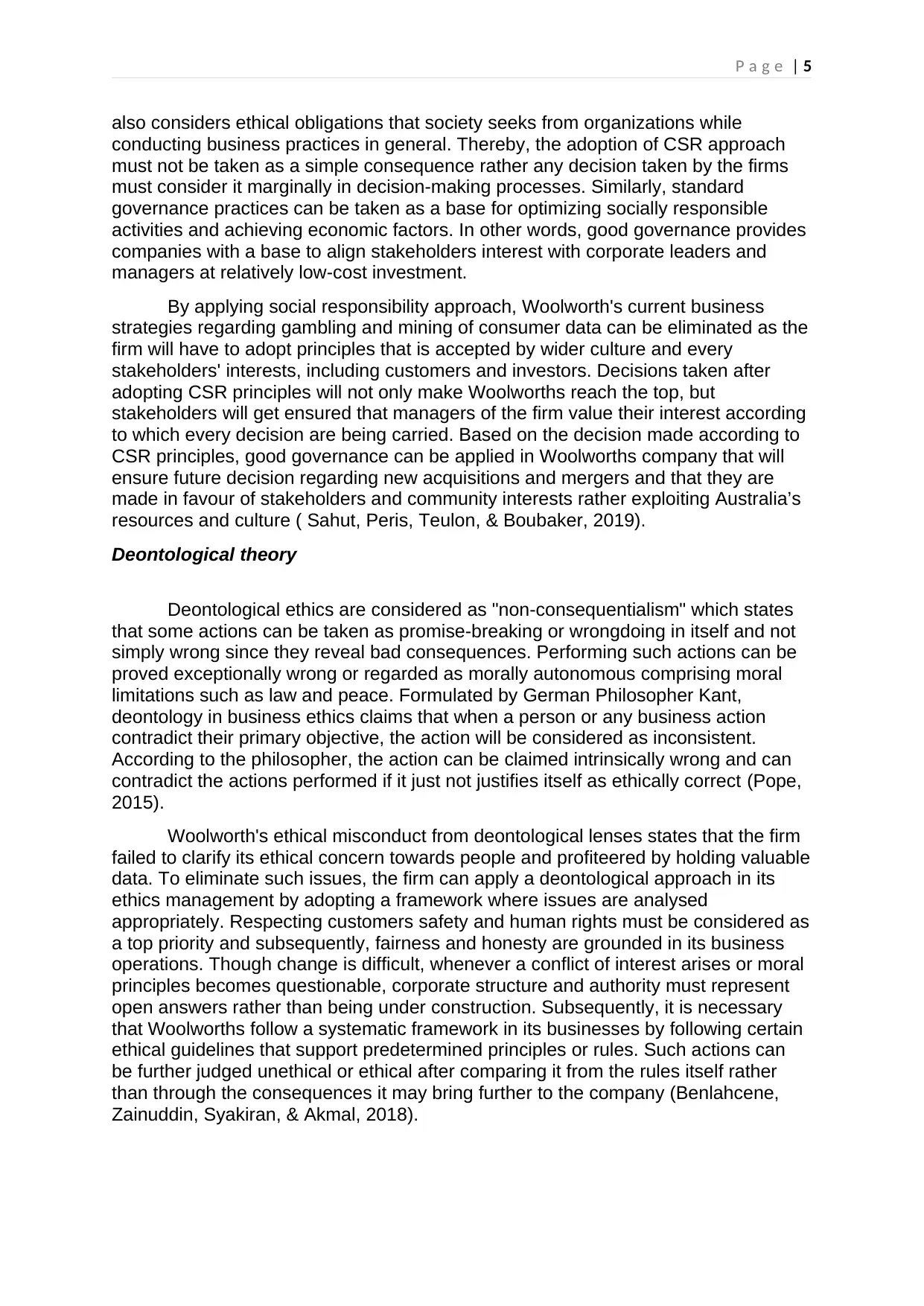
P a g e | 5
also considers ethical obligations that society seeks from organizations while
conducting business practices in general. Thereby, the adoption of CSR approach
must not be taken as a simple consequence rather any decision taken by the firms
must consider it marginally in decision-making processes. Similarly, standard
governance practices can be taken as a base for optimizing socially responsible
activities and achieving economic factors. In other words, good governance provides
companies with a base to align stakeholders interest with corporate leaders and
managers at relatively low-cost investment.
By applying social responsibility approach, Woolworth's current business
strategies regarding gambling and mining of consumer data can be eliminated as the
firm will have to adopt principles that is accepted by wider culture and every
stakeholders' interests, including customers and investors. Decisions taken after
adopting CSR principles will not only make Woolworths reach the top, but
stakeholders will get ensured that managers of the firm value their interest according
to which every decision are being carried. Based on the decision made according to
CSR principles, good governance can be applied in Woolworths company that will
ensure future decision regarding new acquisitions and mergers and that they are
made in favour of stakeholders and community interests rather exploiting Australia’s
resources and culture ( Sahut, Peris, Teulon, & Boubaker, 2019).
Deontological theory
Deontological ethics are considered as "non-consequentialism" which states
that some actions can be taken as promise-breaking or wrongdoing in itself and not
simply wrong since they reveal bad consequences. Performing such actions can be
proved exceptionally wrong or regarded as morally autonomous comprising moral
limitations such as law and peace. Formulated by German Philosopher Kant,
deontology in business ethics claims that when a person or any business action
contradict their primary objective, the action will be considered as inconsistent.
According to the philosopher, the action can be claimed intrinsically wrong and can
contradict the actions performed if it just not justifies itself as ethically correct (Pope,
2015).
Woolworth's ethical misconduct from deontological lenses states that the firm
failed to clarify its ethical concern towards people and profiteered by holding valuable
data. To eliminate such issues, the firm can apply a deontological approach in its
ethics management by adopting a framework where issues are analysed
appropriately. Respecting customers safety and human rights must be considered as
a top priority and subsequently, fairness and honesty are grounded in its business
operations. Though change is difficult, whenever a conflict of interest arises or moral
principles becomes questionable, corporate structure and authority must represent
open answers rather than being under construction. Subsequently, it is necessary
that Woolworths follow a systematic framework in its businesses by following certain
ethical guidelines that support predetermined principles or rules. Such actions can
be further judged unethical or ethical after comparing it from the rules itself rather
than through the consequences it may bring further to the company (Benlahcene,
Zainuddin, Syakiran, & Akmal, 2018).
also considers ethical obligations that society seeks from organizations while
conducting business practices in general. Thereby, the adoption of CSR approach
must not be taken as a simple consequence rather any decision taken by the firms
must consider it marginally in decision-making processes. Similarly, standard
governance practices can be taken as a base for optimizing socially responsible
activities and achieving economic factors. In other words, good governance provides
companies with a base to align stakeholders interest with corporate leaders and
managers at relatively low-cost investment.
By applying social responsibility approach, Woolworth's current business
strategies regarding gambling and mining of consumer data can be eliminated as the
firm will have to adopt principles that is accepted by wider culture and every
stakeholders' interests, including customers and investors. Decisions taken after
adopting CSR principles will not only make Woolworths reach the top, but
stakeholders will get ensured that managers of the firm value their interest according
to which every decision are being carried. Based on the decision made according to
CSR principles, good governance can be applied in Woolworths company that will
ensure future decision regarding new acquisitions and mergers and that they are
made in favour of stakeholders and community interests rather exploiting Australia’s
resources and culture ( Sahut, Peris, Teulon, & Boubaker, 2019).
Deontological theory
Deontological ethics are considered as "non-consequentialism" which states
that some actions can be taken as promise-breaking or wrongdoing in itself and not
simply wrong since they reveal bad consequences. Performing such actions can be
proved exceptionally wrong or regarded as morally autonomous comprising moral
limitations such as law and peace. Formulated by German Philosopher Kant,
deontology in business ethics claims that when a person or any business action
contradict their primary objective, the action will be considered as inconsistent.
According to the philosopher, the action can be claimed intrinsically wrong and can
contradict the actions performed if it just not justifies itself as ethically correct (Pope,
2015).
Woolworth's ethical misconduct from deontological lenses states that the firm
failed to clarify its ethical concern towards people and profiteered by holding valuable
data. To eliminate such issues, the firm can apply a deontological approach in its
ethics management by adopting a framework where issues are analysed
appropriately. Respecting customers safety and human rights must be considered as
a top priority and subsequently, fairness and honesty are grounded in its business
operations. Though change is difficult, whenever a conflict of interest arises or moral
principles becomes questionable, corporate structure and authority must represent
open answers rather than being under construction. Subsequently, it is necessary
that Woolworths follow a systematic framework in its businesses by following certain
ethical guidelines that support predetermined principles or rules. Such actions can
be further judged unethical or ethical after comparing it from the rules itself rather
than through the consequences it may bring further to the company (Benlahcene,
Zainuddin, Syakiran, & Akmal, 2018).
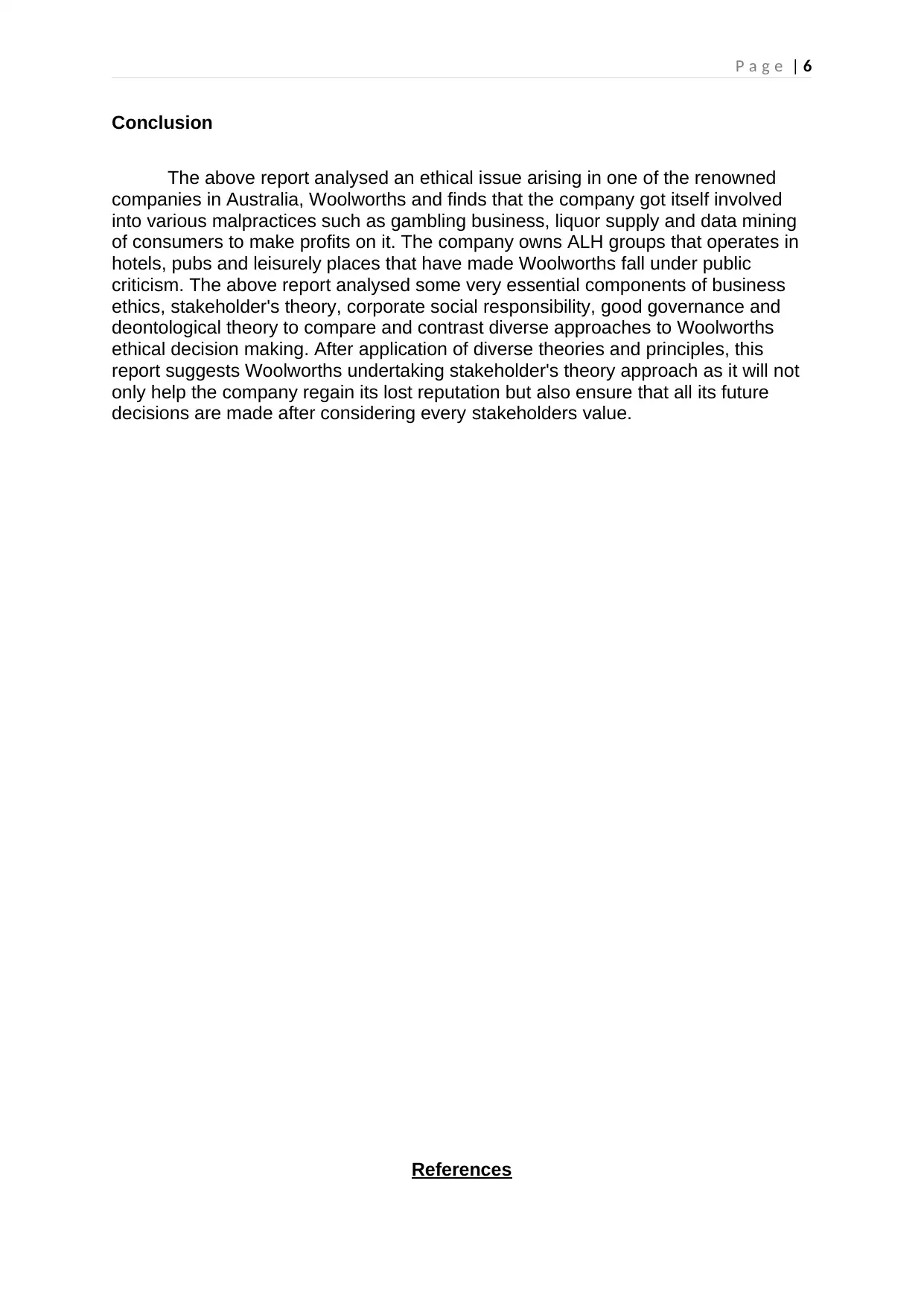
P a g e | 6
Conclusion
The above report analysed an ethical issue arising in one of the renowned
companies in Australia, Woolworths and finds that the company got itself involved
into various malpractices such as gambling business, liquor supply and data mining
of consumers to make profits on it. The company owns ALH groups that operates in
hotels, pubs and leisurely places that have made Woolworths fall under public
criticism. The above report analysed some very essential components of business
ethics, stakeholder's theory, corporate social responsibility, good governance and
deontological theory to compare and contrast diverse approaches to Woolworths
ethical decision making. After application of diverse theories and principles, this
report suggests Woolworths undertaking stakeholder's theory approach as it will not
only help the company regain its lost reputation but also ensure that all its future
decisions are made after considering every stakeholders value.
References
Conclusion
The above report analysed an ethical issue arising in one of the renowned
companies in Australia, Woolworths and finds that the company got itself involved
into various malpractices such as gambling business, liquor supply and data mining
of consumers to make profits on it. The company owns ALH groups that operates in
hotels, pubs and leisurely places that have made Woolworths fall under public
criticism. The above report analysed some very essential components of business
ethics, stakeholder's theory, corporate social responsibility, good governance and
deontological theory to compare and contrast diverse approaches to Woolworths
ethical decision making. After application of diverse theories and principles, this
report suggests Woolworths undertaking stakeholder's theory approach as it will not
only help the company regain its lost reputation but also ensure that all its future
decisions are made after considering every stakeholders value.
References
⊘ This is a preview!⊘
Do you want full access?
Subscribe today to unlock all pages.

Trusted by 1+ million students worldwide
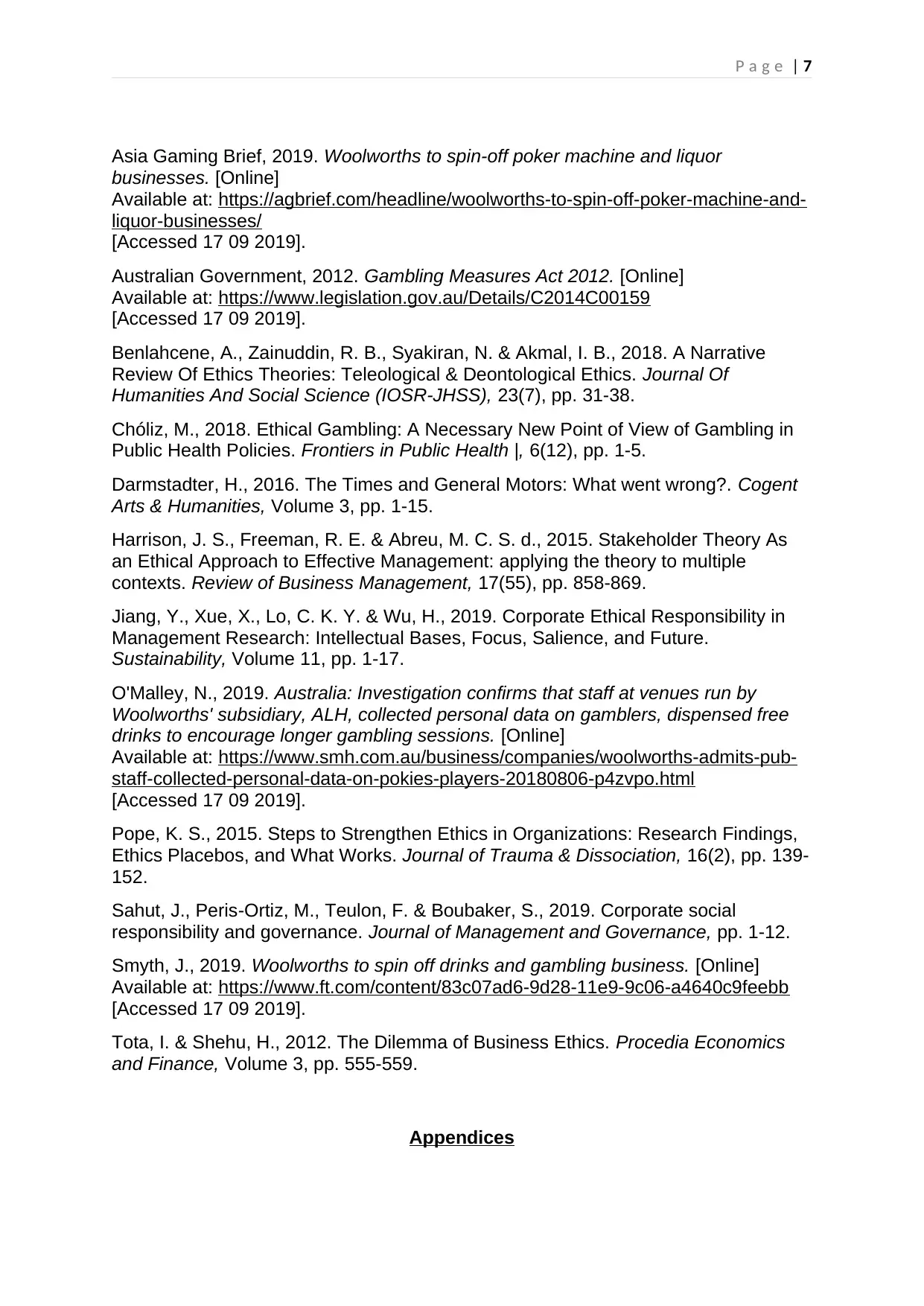
P a g e | 7
Asia Gaming Brief, 2019. Woolworths to spin-off poker machine and liquor
businesses. [Online]
Available at: https://agbrief.com/headline/woolworths-to-spin-off-poker-machine-and-
liquor-businesses/
[Accessed 17 09 2019].
Australian Government, 2012. Gambling Measures Act 2012. [Online]
Available at: https://www.legislation.gov.au/Details/C2014C00159
[Accessed 17 09 2019].
Benlahcene, A., Zainuddin, R. B., Syakiran, N. & Akmal, I. B., 2018. A Narrative
Review Of Ethics Theories: Teleological & Deontological Ethics. Journal Of
Humanities And Social Science (IOSR-JHSS), 23(7), pp. 31-38.
Chóliz, M., 2018. Ethical Gambling: A Necessary New Point of View of Gambling in
Public Health Policies. Frontiers in Public Health |, 6(12), pp. 1-5.
Darmstadter, H., 2016. The Times and General Motors: What went wrong?. Cogent
Arts & Humanities, Volume 3, pp. 1-15.
Harrison, J. S., Freeman, R. E. & Abreu, M. C. S. d., 2015. Stakeholder Theory As
an Ethical Approach to Effective Management: applying the theory to multiple
contexts. Review of Business Management, 17(55), pp. 858-869.
Jiang, Y., Xue, X., Lo, C. K. Y. & Wu, H., 2019. Corporate Ethical Responsibility in
Management Research: Intellectual Bases, Focus, Salience, and Future.
Sustainability, Volume 11, pp. 1-17.
O'Malley, N., 2019. Australia: Investigation confirms that staff at venues run by
Woolworths' subsidiary, ALH, collected personal data on gamblers, dispensed free
drinks to encourage longer gambling sessions. [Online]
Available at: https://www.smh.com.au/business/companies/woolworths-admits-pub-
staff-collected-personal-data-on-pokies-players-20180806-p4zvpo.html
[Accessed 17 09 2019].
Pope, K. S., 2015. Steps to Strengthen Ethics in Organizations: Research Findings,
Ethics Placebos, and What Works. Journal of Trauma & Dissociation, 16(2), pp. 139-
152.
Sahut, J., Peris-Ortiz, M., Teulon, F. & Boubaker, S., 2019. Corporate social
responsibility and governance. Journal of Management and Governance, pp. 1-12.
Smyth, J., 2019. Woolworths to spin off drinks and gambling business. [Online]
Available at: https://www.ft.com/content/83c07ad6-9d28-11e9-9c06-a4640c9feebb
[Accessed 17 09 2019].
Tota, I. & Shehu, H., 2012. The Dilemma of Business Ethics. Procedia Economics
and Finance, Volume 3, pp. 555-559.
Appendices
Asia Gaming Brief, 2019. Woolworths to spin-off poker machine and liquor
businesses. [Online]
Available at: https://agbrief.com/headline/woolworths-to-spin-off-poker-machine-and-
liquor-businesses/
[Accessed 17 09 2019].
Australian Government, 2012. Gambling Measures Act 2012. [Online]
Available at: https://www.legislation.gov.au/Details/C2014C00159
[Accessed 17 09 2019].
Benlahcene, A., Zainuddin, R. B., Syakiran, N. & Akmal, I. B., 2018. A Narrative
Review Of Ethics Theories: Teleological & Deontological Ethics. Journal Of
Humanities And Social Science (IOSR-JHSS), 23(7), pp. 31-38.
Chóliz, M., 2018. Ethical Gambling: A Necessary New Point of View of Gambling in
Public Health Policies. Frontiers in Public Health |, 6(12), pp. 1-5.
Darmstadter, H., 2016. The Times and General Motors: What went wrong?. Cogent
Arts & Humanities, Volume 3, pp. 1-15.
Harrison, J. S., Freeman, R. E. & Abreu, M. C. S. d., 2015. Stakeholder Theory As
an Ethical Approach to Effective Management: applying the theory to multiple
contexts. Review of Business Management, 17(55), pp. 858-869.
Jiang, Y., Xue, X., Lo, C. K. Y. & Wu, H., 2019. Corporate Ethical Responsibility in
Management Research: Intellectual Bases, Focus, Salience, and Future.
Sustainability, Volume 11, pp. 1-17.
O'Malley, N., 2019. Australia: Investigation confirms that staff at venues run by
Woolworths' subsidiary, ALH, collected personal data on gamblers, dispensed free
drinks to encourage longer gambling sessions. [Online]
Available at: https://www.smh.com.au/business/companies/woolworths-admits-pub-
staff-collected-personal-data-on-pokies-players-20180806-p4zvpo.html
[Accessed 17 09 2019].
Pope, K. S., 2015. Steps to Strengthen Ethics in Organizations: Research Findings,
Ethics Placebos, and What Works. Journal of Trauma & Dissociation, 16(2), pp. 139-
152.
Sahut, J., Peris-Ortiz, M., Teulon, F. & Boubaker, S., 2019. Corporate social
responsibility and governance. Journal of Management and Governance, pp. 1-12.
Smyth, J., 2019. Woolworths to spin off drinks and gambling business. [Online]
Available at: https://www.ft.com/content/83c07ad6-9d28-11e9-9c06-a4640c9feebb
[Accessed 17 09 2019].
Tota, I. & Shehu, H., 2012. The Dilemma of Business Ethics. Procedia Economics
and Finance, Volume 3, pp. 555-559.
Appendices
Paraphrase This Document
Need a fresh take? Get an instant paraphrase of this document with our AI Paraphraser
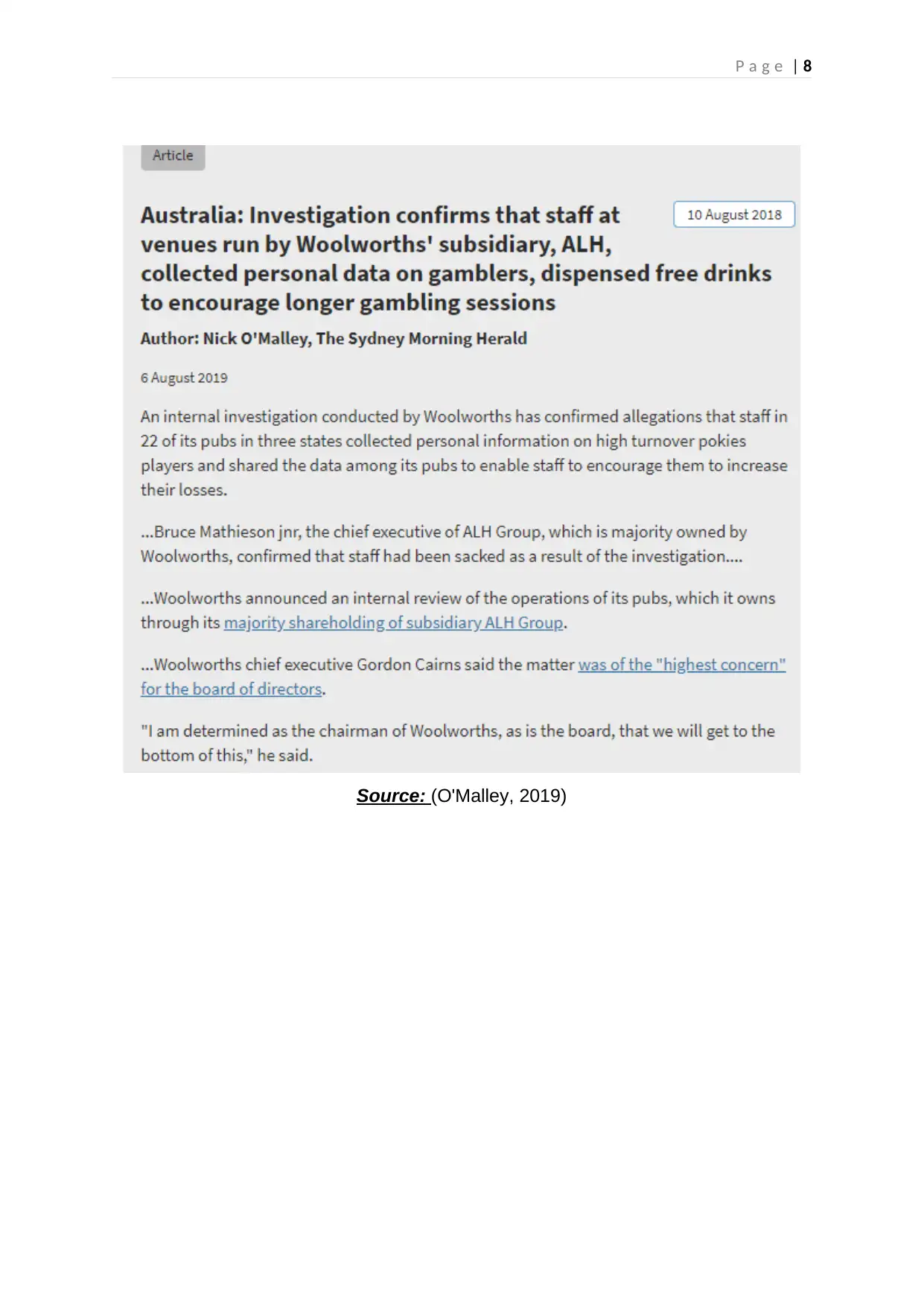
P a g e | 8
Source: (O'Malley, 2019)
Source: (O'Malley, 2019)
1 out of 8
Your All-in-One AI-Powered Toolkit for Academic Success.
+13062052269
info@desklib.com
Available 24*7 on WhatsApp / Email
![[object Object]](/_next/static/media/star-bottom.7253800d.svg)
Unlock your academic potential
Copyright © 2020–2026 A2Z Services. All Rights Reserved. Developed and managed by ZUCOL.

